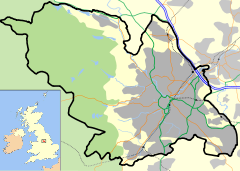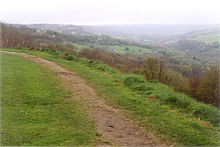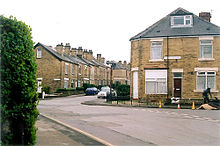- Crookes
-
Coordinates: 53°23′02″N 1°30′29″W / 53.384°N 1.508°W
Crookes
 Crookes shown within Sheffield
Crookes shown within SheffieldPopulation 10,507 [1] Metropolitan borough City of Sheffield Metropolitan county South Yorkshire Region Yorkshire and the Humber Country England Sovereign state United Kingdom Post town SHEFFIELD Postcode district S10 Dialling code 0114 Police South Yorkshire Fire South Yorkshire Ambulance Yorkshire EU Parliament Yorkshire and the Humber UK Parliament Sheffield Central, Sheffield Hallam and Sheffield Hillsborough List of places: UK • England • Yorkshire For other uses, see Crookes (disambiguation).Crookes is a suburb of the City of Sheffield, England, about 1.5 miles (2.4 km) west of the city centre. It borders Broomhill to the south, Walkley and Crookesmoor to the east and open countryside around the River Rivelin to the north. The suburb is said to derive its name from the Old Norse "Krkor" which means a nook or corner of land.[2]
The Bole Hills ( 53°23′26″N 1°30′38″W / 53.390597°N 1.510491°W ) at Crookes, overlooking the Rivelin Valley, was the site of open air smelting, and Bronze Age (about 1500 BC) funerary remains, similar to those of contemporary tribes sometimes called the Urn people, were found near this site in 1887. Sidney Addy reports the find in his 1888 book on the Sheffield area [3] citing;
"On Easter Sunday [1887] Mr. Herbert T. Watkinson, of Summer Street, was walking in Cocked Hat Lane, (later to become Tinker Lane) near the Bole Hills, at Crookes, when he noticed in the side of an excavation that had been made for the foundations of some new houses what looked like a drain pipe. Closer examination revealed two rude earthenware urns, one inverted within the other, and the two containing a quantity of calcined bones, some broken fragments of a bronze spear-head or dagger, and a smaller urn pierced on one side with two round holes. The outer urn fell to pieces, but the one inverted within it was recovered whole. It is of a type very common in British burial mounds, and stands 9½ inches high, and measures across the mouth 7¼ inches, while the largest circumference is 26 inches. It is ornamented with the familiar straight and diagonal lines, and rows of dots. The urns lay six or eight inches below the surface, and were surrounded with charcoal. We are glad to hear that this curious relic of our ancient British ancestors will be exhibited in the Weston Park Museum."
The urn was discovered near St Antony's Well, which was believed to have medicinal properties.[4]
Crookes lies near the course of a Roman road from Templeborough to Brough-on-Noe. This area was sparsely settled until the 1790s, when a turnpike road was opened from Sheffield to Glossop, running via the southern end of Crookes, spurring development of the area. Names of roads such as Truswell Road, Headland Road, and Headland Drive are references to the mediaeval open fields that survived in this area into the late 18th century. In the 19th century this area became a popular 'holiday' spot for residents of Sheffield to escape the soot and grime of the town.
The centre of Crookes is focused on the main road which runs through the suburb, Crookes Road, which connects Broomhill and Crookes before merging into Northfield Road. Crookes Road features the majority of Crookes' shops and businesses, which include a Cooperative, a Sainsbury's and numerous small local stores. Popular institutions include St. Thomas' church on Nairn Street, Crookes Working Men's Club, on Mulehouse Road. Crookes Working Men's Club was established in 1926 and was a venue of Def Leppard who played there in 1979. Notable pubs in Crookes include The Old Grindstone, The Princess Royal, Masons Arms, The Cobden View Hotel, The Punchbowl, The Ball Inn and Noah's Ark.[5]
Famous people from Crookes include Joe Cocker.
A large number of students from Sheffield University live in the area.
The instrumental track "The Bus To Crookes" by The Human League was inspired by a bus journey to the area. At present, Crookes is served by the 52 bus, which runs from the city centre through Broomhill to Crookes and Hillsborough.
See also
References
- ^ Detailed Profile of Crookes, Sheffield City Council
- ^ http://freepages.genealogy.rootsweb.com/~engsheffield/webpages/derivisions.htm Sheffield area name dervations, Rootsweb
- ^ http://en.wikisource.org/wiki/A_glossary_of_words_used_in_the_neighbourhood_of_Sheffield/Local_Names#_ref-8 A glossary of words used in the neighbourhood of Sheffield, including a selection of local names, and some notices of folklore games, and customs (S. Addy, 1888)
- ^ J. Edward Vickers, The Ancient Suburbs of Sheffield, p.23 (1971)
- ^ crookesonline.co.uk
Districts of Sheffield Abbeydale · Attercliffe · Batemoor · Beauchief · Beighton · Bradfield (High Bradfield · Low Bradfield) · Brightside · Burngreave · Carbrook · Chapeltown · Crookes · Crosspool · Darnall · Dore · Ecclesall · Ecclesfield · Fulwood · Gleadless · Greenhill · Grenoside · Halfway · Handsworth · Heeley · Hemsworth · Highfield · High Green · Hillsborough · Hyde Park · Longley · Lowfield · Loxley · Malin Bridge · Manor · Meersbrook · Middlewood · Millhouses · Mosborough · Neepsend · Nether Edge · Norton · Owlerton · Oughtibridge · Park Hill · Pitsmoor · Ranmoor · Ringinglow · Sharrow · Stocksbridge · Tinsley · Totley · Wadsley · Wadsley Bridge · Walkley · Wisewood · Woodseats · Woodhouse · Worrall
Categories:
Wikimedia Foundation. 2010.




